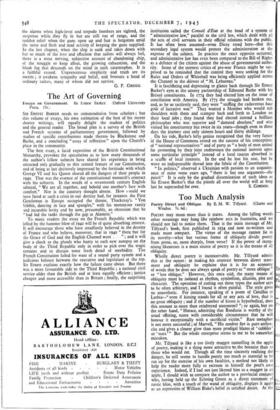The Art of Governing
SIR ERNEST BARKER needs no commendation from scholars ; but this volume of essays, his own estimation of the best of his recent shorter writings, will equally delight the student of politics and the general reader. The broad plan is a survey of the British and French systems of parliamentary government, followed by studies of specific contributions made thereto by Blackstone and Burke, and a concluding "essay of reflection" upon the Church's place in the community.
The first essay, a lucid exposition of the British Constitutional Monarchy, provokes the speculation as to how many thousands of the author's fellow subjects have shared his experience in being attracted only gradually to this central feature of our Constitution, and of being at last decisively impressed by the fortitude with which George VI and his Queen shared all the dangers of their people in 1940. That was the essence of the constitutional monarch's contract with his subjects. In the words of a seventeenth century English admiral, "We are all together, and behold one another's face with comfort." Nor is the contrary thought absent. How saould we have fared at such a crisis in our destiny had, for instance. the First Gentleman in Europe occupied the throne, Thackeray's "Yon fribble, dancing in lace and spangles," with his monstrous vanity and incurable levity and by now, presumably, an obsession that he had led the tanks through the gap at Alamein."
To many readers the essay on the French Republic which was felled by the hammer blow of 1940 will be of quite absorbing interest. It will encourage those who have steadfastly believed in the destiny of France and who believe, moreover, that in 1940 "there but for the Grace of God and the English Channel went . ." ; and it will give a check to the ghouls who hurry to each new autopsy on the body of the Third Republic only in order to pick over the tragic remains and to discuss some fresh detail of morbidity. The French Constitution failed for want of a sound party system and a judicious balance between the executive and legislature at the top. Sir Ernest explains exactly how the failure came about. But there was a more favourable side to the Third Republic ; a national civil service older than the British and at least equally efficient ; justice cheaper and more accessible than in Britain ; finally, the surprising
institution called the Conseil d'Etat at the head of a system of " administrative law," parallel to the civil law, which dealt with all the acts of civil servants in their official relations with the public. It has often been assumed—even Dicey erred here—that this secondary legal system would protect the administration at the expense of the subject. In practice the exact opposite occurred, and administrative law has even been compared to the Bill of Rights as a defence of the citizen against the abuse of governmental autho- rity. Some of the sternest critics of pre-war France might be sur- prised to be reminded that the control they were seeking for the Rules and Orders of Whitehall was being efficiently applied across the Channel to the (Morels of "M. Lebureau."
It is fascidating and depressing to glance back through Sir Ernest Barker's eyes at the uneasy partnership of Edmund Burke with his Bristol constituents. In 1774 they had elected him on the issue of conciliation with America. By 1775 the struggle had broken out, and, as he so tactlessly said, they were "sniffing the cadaverous haut via of lucrative war." They wanted a Member who would rub shoulders with them and scamper back and forth to London on their local jobs ; they found they had elected instead a brilliant philosopher who was superior and "damned absolute," and who visited his constituency but twice in six years—though even in those days the journey cost only sixteen hours and thirty shillings.
On his side, Burke's lofty genius recognised that the very future of the House of Commons rested on the success of his conceptions of "national representatives" and of party as "a body of men united for promoting by their joint endeavours the national interest upon some particular principle" instead of a local caucus absorbed in a scuffle of local interests. In the end he lost his seat, but he wove an indispensable thread into the fabric of the Constitution.
"In politics," observed a Ukrainian with passion to an acquaint- ance of mine some years ago, "there is but one argument—the pistol." It is only by the gradual dissemination of such ideas as Sir Ernest Barker's that the pistols all over the world will at long






























 Previous page
Previous page